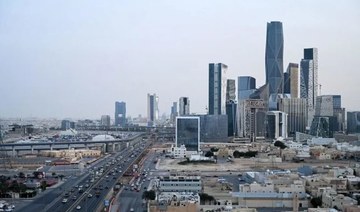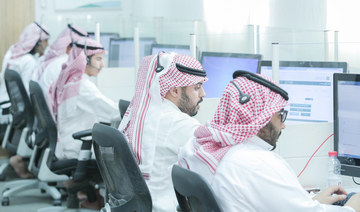DUBAI: To achieve its Vision 2030 goals, Saudi Arabia is not only encouraging the recruitment of nationals to private-sector jobs, but is also encouraging adequate investment in their future to ensure their retention by employers as well as their contribution to a vibrant and diverse economy.
Going by performance metrics, the Kingdom is on the right track. New Saudi employees entering the private sector reached 121,000 in the first quarter of 2021, according to a report issued by the Human Resources Development Fund.
Another report by the National Labor Observatory in April this year indicated that Saudization in the private sector rose to 22.75 percent in the first quarter, compared to 20.37 percent during the same period last year.
Seven major private sector job groupings have achieved Saudization of more than 50 percent. While the rate across the private sector as a whole is around 25 percent, Al-Eqtisadiah newspaper reported that the finance and insurance sectors had achieved a rate of 83.6 percent.
This was followed by public administration, defense and mandatory social insurance at 71.9 percent, mining and quarrying at 63.2 percent, education at 52.9 percent and information and communications at 50.7 percent.
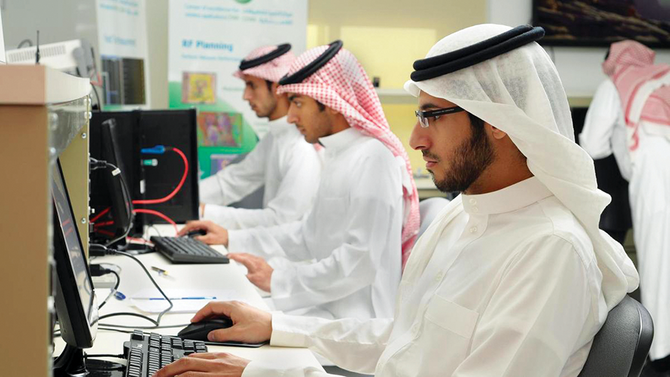
Saudi Arabia has the lowest dependence on foreign labor among Gulf Cooperation Council countries at around 77 percent, while Qatar has the highest, at about 94 percent. (Social media)
Saudi Arabia now has the lowest dependence on foreign labor among GCC countries at about 77 percent, while Qatar has the highest at about 94 percent, according to data from S&P Ratings.
Ahmed Al-Rajhi, minister of human resources and social development, recently announced plans to create 40,000 new jobs in the fields of law, customs, real estate, cinemaa, driving schools and technical and engineering professions, with an overall target of 203,000 jobs this year alone.
Although the process of Saudization has been going on since 1985, major regulatory and economic reforms have accelerated in recent years under the Vision 2030 agenda, with the aim of increasing the participation of young Saudis in the economy, promoting non-oil sectors and improving overall quality of life.
“Within the different reforms and programs of Vision 2030, the Saudization surge involved vitalizing various aspects of the economy, including tourism, infrastructure, and education,” Mona Althagafi, KSA country director of the British services contractor Serco, told Arab News.
“Another factor for the increase in Saudization is the government’s reservation of a total of 177 professions exclusively for Saudi nationals. Although most of these started as junior roles, they are now looking to increase to more senior levels.”
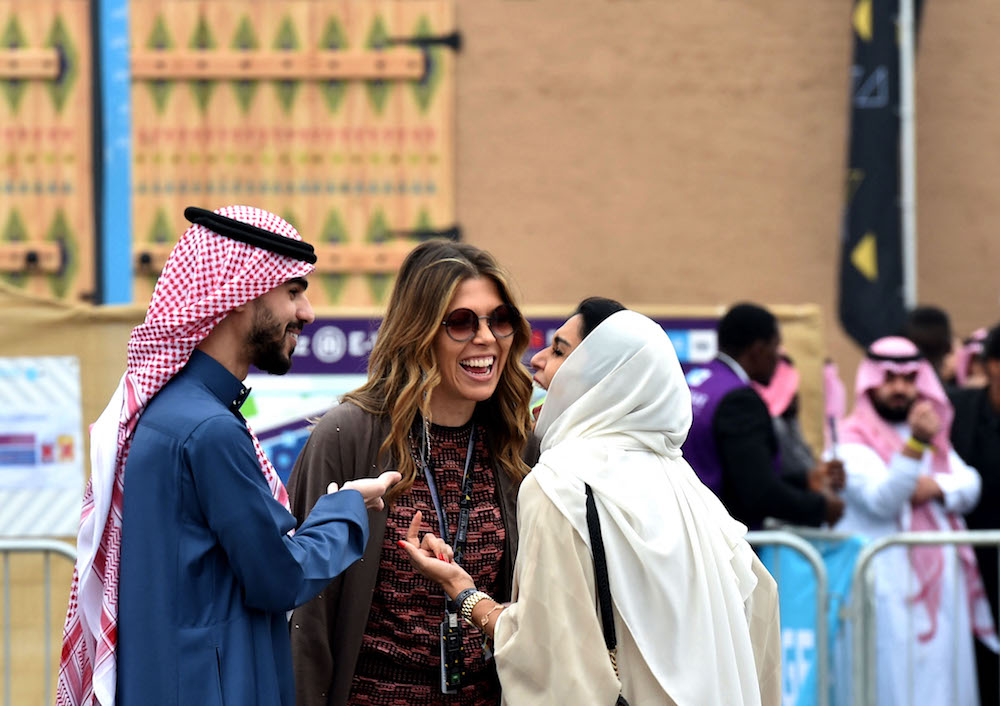
Saudization, officially known as the Saudi nationalization scheme, or Nitaqat, is considered a crucial step towards economic success. (AFP/File Photo)
Saudization, officially known as the Saudi nationalization scheme, or Nitaqat, is considered a crucial step towards economic success. The private sector itself also stands to gain.
“With the reforms in the Kingdom, companies will be targeted by the younger Saudi generations,” Althagafi said.
“Hiring younger employees or recent graduates can benefit international companies in establishing their new appeal to the younger market while new Saudi hires can gain international experience, which benefits the local economy.
“Additionally, hiring employees with less experience allows companies to train them to the standard and methods that they prefer and allows Saudis to explore new environments that would help them nourish their skills and, in turn, grow the Saudi economy.”
Serco says that, as a strong supporter of Saudization, it has identified several ways to ensure the right approach is adopted by the Kingdom. One of these is training, which is often overlooked.
“To ignore training and development is to completely miss the point and is a disservice to the country in which you have operated your business successfully and lucratively,” Hana Abu Kharmeh, Serco’s regional human resources director, wrote in a recent op-ed for the HR Observer.
“By taking the time to source the right national for a given role and making the investment required to develop, train and qualify them, you will increase not only their capability to help your business grow, but also their engagement in your business and its vision.”
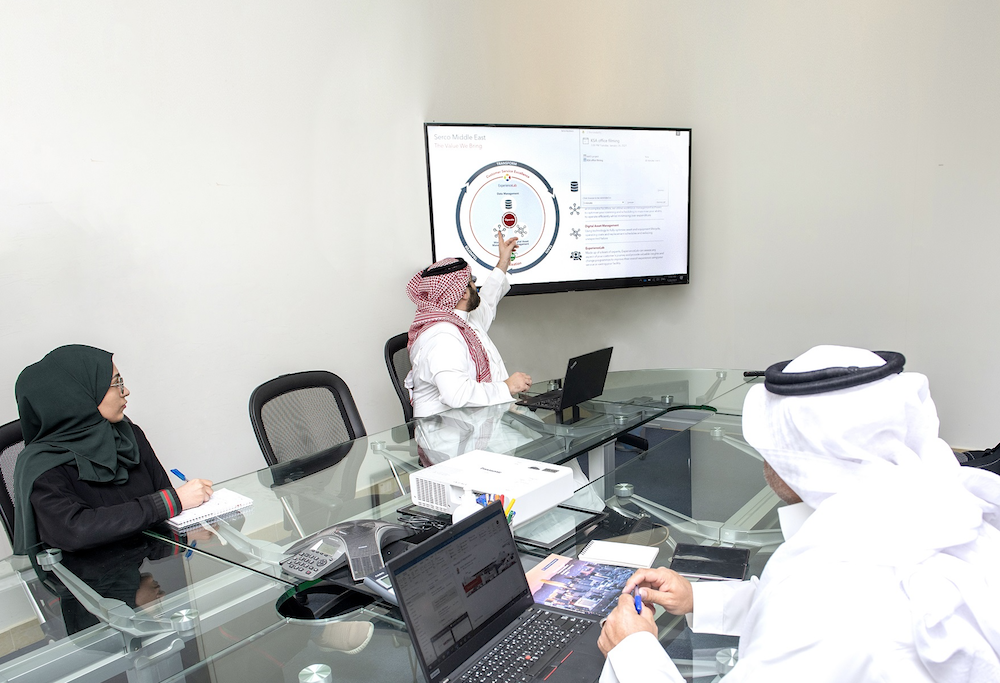
Serco says that, as a strong supporter of Saudization, it has identified several ways to ensure the right approach is adopted by the Kingdom. (Supplied/Serco)
Aligned with the Kingdom’s Vision 2030 agenda, Serco’s focus is to develop local talent to become leaders of the future by offering a suite of development programs for Saudi nationals at all levels of the organization.
“We deliver a comprehensive range of skills, training and talent development programs on behalf of local and central governments, including vocational training and development, in-working for businesses, and leadership development and programs that target the specific needs of communities and the different growth needs of local businesses, in support of government nationalization objectives,” Althagafi said.
Serco recently launched the Fursati Program for national students across its contracts. The course offers students from local universities an eight-week internship placement in Serco’s contracts and functions, exposing them to ways of working in a multinational environment.
“Students will gain theoretical and experiential learning in the areas of their placements, and in turn, learn more about the career paths available to them in Serco,” Althagafi said.
Although public-sector jobs are often considered more prestigious and secure, collaborations between private sector employers, educational institutions and policymakers from an early stage can help change that.

Mona Althagafi, KSA country director of the British services contractor Serco. (Supplied/Serco)
“Private companies are competing with public entities in obtaining the local talent and it is only in the private sector that jobs can be created in order to achieve Saudization,” Althagafi said.
“In recent years, the Saudi government has made progress in reducing the number of foreign workers, and it will continue to push Saudization to replace foreigners with Saudis.
“However, there are jobs that Saudis will not take. As a result, Saudization will be achieved slowly as there continues to be dependency on foreign workers in those positions.”
Serco is not the only foreign company to throw its weight behind Saudization. American aerospace giant Boeing has also been actively supporting Saudi industry and local recruitment.
The company signed a deal with Saudia Aerospace Engineering Industries and Alsalam Aerospace Industries in 2015 to create the Saudi Rotorcraft Support Company, under which Saudi pilots and maintenance teams receive training.
Boeing has also launched the KSA College Graduate Program to create opportunities for Saudi engineering graduates from American schools, allowing them to acquire work experience before returning to the Kingdom.
Last year, Swedish telecommunications giant Ericsson received the Rawafed Award for Saudization for its efforts identifying and retaining top local talent.
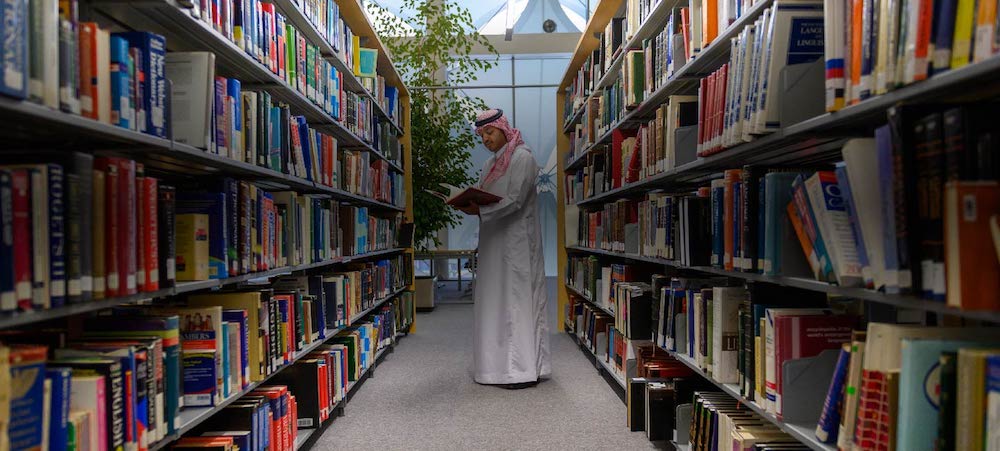
One way to approach nationalization is to educate young people about the opportunities that await them, eliminating concerns about working outside the public sector. (Supplied)
Ericsson has been expanding its talent pool in the Kingdom since 2017 and is eager to allocate more leadership positions to locals. It has also created a graduate program with select universities to hoover up top engineering talent and offer them a rewarding career. It was even named Employer of Choice for Young Saudis in 2020.
Although it is still early days for the Saudi government’s strategy to reduce the private sector’s dependence on expatriate workers, Althagafi believes young Saudis are beginning to recognize the benefits, thanks to state investment in education.
“Education is seen as a challenge and an important area of focus, and to this end, the Saudi government increased education spending to upskill the local talent,” Althagafi said.
“Finding the right talent for the right position is key to the success of private companies, and the challenge is to be able to develop the skills of Saudis while they are on the job.
“Many organizations view nationalization as just another exercise to accomplish, while in fact, there are many layers to this exercise that won’t only benefit the employee but also the employers and, eventually, the Kingdom.”
One way to approach nationalization is to educate young people about the opportunities that await them, eliminating concerns about working outside the public sector.
“Saudization will succeed if the private and public sectors work together, as it is important that the public sector is not competitive with the private sector,” Althagafi said.
“At the same time, the private sector can offer better opportunities to young Saudis which are more attractive, beneficial, financially viable and provide the standard of living Saudis mostly desire.”
-------------------
Twitter: @CalineMalek




